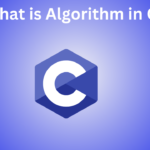
In the C programming language, the basic model of computation is imperative and follows the Von Neumann architecure, which is the foundation for most modern computer systems. This model of computation can be summarized as follows:
Sequential Execution:- C programs are executed sequentially, one statement at a time, starting from the main function or the designated entry point. The program’s flow of control follows a linear path, executing statements in the order they are written.
Variable and Data Type:- C allows you to define variables of various data types (e.g., integers, floating-point numbers, characters) to store and manipulate data. You can also define user-defined data types using structs and enums.
Operators and Expressions:- C provides a wide range of operators for performing arithmetic, logical, and bitwise operation no data. Expressions in C are formed by combining variables, literals, and operators.
Control Structure:-
(i) Conditional Statements:- C includes if, else if, and else statements for implementing conditional logic.
(ii) Loops:- C provides for, while, and do-while loops for repetitive tasks.
(iii) Functions:- Functions are a fundamental building block of C programs. You can define functions to encapsulate specific tasks, which promotes code modularity and reusability. The main function is the entry point of a C program.
Pointers:- C supports pointers, which are variables that store memory addresses. Pointers are crucial for low-level memory management and for passing data by reference to functions.
Input and Output:- C provides standard I/O functions (printf and scanf) for input and output operations. These functions allow you to interact with the user and read/write data to and from files.
Libraties:- C comes with a standard library (C Standard Library) that provides a set of functions for various common tasks. Additionally, you can use external libraties for additional functionality.
Compile and Execute:- C programs are typically written in source files (.c) and need to be compiled using a C compiler (e.g. GCC) to generate exutable files. These executables can then be fun on the target system.





There’s definately a great deal to know about this subject.
I love all the points you have made.
Thanks
I am actually grateful to the holder of this web page who has shared this enormous paragraph at
at this time.
Hi there, You’ve done an incredible job. I will certainly digg it and personally suggest to my friends.
I am sure they’ll be benefited from this web site.